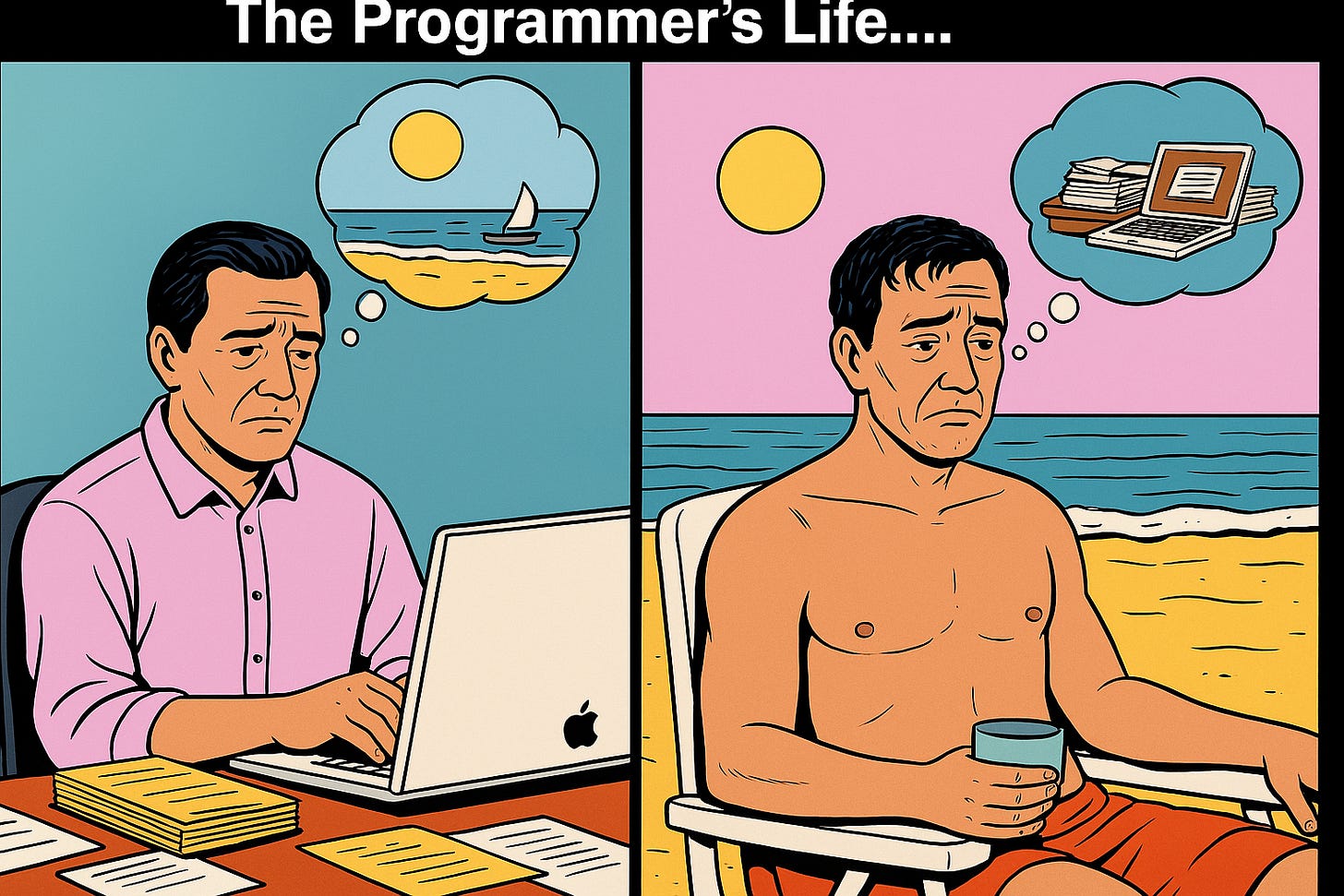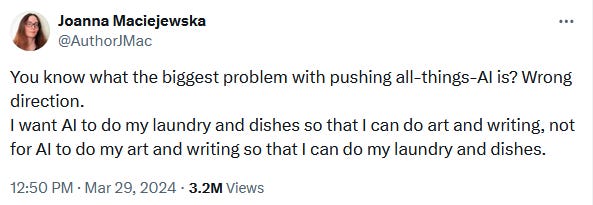The Middle Class Trap
Creation vs Consumption
A recent essay by
explores the question of “what is the safest way to upper middle class?”:Lane did a great job dissecting the disconnect between upper middle class income and lifestyle, what it means to be lower/middle/upper middle class today vs in the past and the impact of mothers on social mobility.
Relatedly, I’ve recently listened to Nick Maggiuli, the author of The Wealth Ladder on the Art of Manliness podcast, discussing the concepts like grocery/restaurant/travel freedom, the 6 levels of wealth (level 1 <$10k net worth, level 2 $10k-100k net worth, and so on) and corresponding financial advice.
I’ve been pondering the “path to upper-middle class” question from a different angle for some time. Both me and my wife come from lower-middle class families, but now, in our mid-30s we have reached the upper-middle class wealth and income levels. We can actually afford all of the upper-middle class stuff.
Yet, for some reason it doesn’t feel like we’re upper-middle class yet.
So, is there something we need to do, change or afford to truly transition to upper-middle class, or are we stuck in the upper end of the middle class forever?
Both Lane’s and Nick’s takes on wealth and status didn’t provide a direct answer, but at least pointed me in the right direction to focus on what’s missing.
Part of the problem is semantics. “Upper-middle” class sounds like it’s the upper end of middle class - basically the same as middle class, but with more wealth and income. But to me, it seems that upper-middle class is a lot more similar to the elite than to the middle class - a better name for it would be “lower-elite class”.
Eventually, I realized that the middle-to-upper-middle transition is hard because it requires a profound mindset shift. On the other hand, the lower-to-middle class and the upper-middle-to-elite class transitions are easier since they are within the same mindset, so they’re just about acquiring more wealth, income, social power and efficiency.
We can call these two distinct mindsets Upper Class Mindset and Lower Class Mindset. The UCM/LCM abbreviations can be used for both the mindsets, and by extension, the people with such mindset.
The key difference between the two mindsets is related to corresponding types of work:
Creative work
Creative work is any type of work where initially both the end state, and the way to get there - both the “what” and “how” - are unknown. This is basically any kind of work that starts with a literal or figurative blank canvas - or a random “Aha!” moment.
Things like music and art, or being a “designer” of something are usually considered creative work. Science and academic work is also creative - the first step is always to decide what to research next. But an often overlooked type of creative work is business.
Businesses, like art, also start from a blank canvas or an “Aha!” moment. And a big, innovative business is an environment where not only top-down, but also organic, grassroots creativity can flourish.
For example, if your idea is to build a new type of a passenger jet, you can try the startup approach and pitch your idea to investors hoping to bring them on board and hand over some money so you can build your passenger jet company from scratch. But your best bet is probably to get hired by Boeing, rise through the ranks of their R&D department and eventually pitch your idea to the executives to have your project approved.
Artists and others doing small scale creative work are usually able to execute their vision themselves, but for larger scale projects, people doing other types of work can be brought in to execute. An architect designing a building and handing off the construction to a contractor, a businessman “hiring smart people so they can tell him what to do”, a theoretical physicist having his theory proven decades later when experimental physicists are finally able to access technology required to detect the proposed type of waves or particles - all of them are still doing creative work.
Grunt work
The opposite of creative work - doing just what you’re told to do. Both the “what” and “how” are known, the only thing left is execution.
If every single action and circumstace that happens during your work is covered in one of the Standard Operating Procedures, and anything extraordinary requires escalation to your supervisor, you are doing grunt work.
Problem solving
The middle ground between the two above - the vision, problem or target state is already defined, but the path from the starting point to the end goal is not clear. The “what” is known, but the “how” is unknown.
Problem solvers excercise intelligence, agency and autonomy - but it’s all in order to reach a goal or solve a problem invented by someone else.
In industry, the inventor is doing creative work, the engineer is problem solving, and the guys at the shop floor making the parts and assembling the devices are doing grunt work.
The type of work, like everything in life, is fuzzy and the above categories represent the ends of a spectrum. An artist paiting on a literal blank canvas can be considered doing purely creative work. An an architect designing “a 100-story, mixed use skyscraper” is somewhere on the creative-problem solving spectrum as his problem has been partially defined, but he’s still way closer to the creative end than a software developer working against a detailed, precise requirements specification.1
The Upper Class Mindset (UCM)
The defining feature of the upper class mindset is the ability to find fulfillment in creative work.
UCM find intrinsic value in creative work. They consider creativity a virtue.
UCM can focus on creative work as all of their basic needs (corresponding to the popular image of an upper-middle class lifestyle, family and social life) are fully met, with no regrets or compromises.
They possess the skills, education, credentials, equipment and social connections required for a given type of creative work. They are also able to spend considerate amounts of time on their creative work, and they have enough conscientuousness to actually spend this time on creative work rather than leisure and consumption.
Three distinct UCM lifestyle patterns are:
Being successful in creative work such that it provides for a main source of income.
Having a high-salary problem solving job and carving out enough spare time to do fulfilling creative work, via lifestyle optimization.
Relying on alternate sources of income (old money/trust fund/income-producing assets/high-earning husband) to spend most time on creative work.
Two major components of UCM is finding creative work intrinsicly valuable and being able to afford doing it.
As for the “poor struggling artist” stereotype - a starving writer, a jobless actor getting repeatedly rejected at auditions, a painter who lived and died in poverty, and only became famous posthumously - UMC love these stories as examples of being devoted to the virtue of creativity against all odds. Yet, I believe that in real life very few of those finding creative work valuable, but not being able to afford it remain “poor struggling artists” for long - instead, they cope by pivoting to LCM.
The Lower Class Mindset (LCM)
The defining feature of the lower class mindset is the inability to find fulfillment in creative work.
LCM don’t consider creative work valuable, which typically also correlates with not being able to afford doing creative work the way UCM do.
Based on either the traditional protestant work ethic or post-communist working class sensibilities, LCM typically find work valuable2 - but the only types of work they consider valid are grunt work and problem solving.
Yet, LCM also yearn for leisure and consumption - they know that all work and no play makes Jack a dull boy. When provided with spare time and money, LCM will spend it on leisure, consumption, socializing or catching up on their backlog of grunt/problem solving work.
The seemingly small difference between UCM and LCM results in profound differences in lifestyle choices and preferences.
Creative work
When required to do creative work, LCM find it both hard (due to lack of both creativity and creative skills3) and unfulfilling (they think it’s a waste of time). They would rather have someone come and tell them what grunt work needs to be done or what problem needs to be solved, change their job to avoid the stress of having to come up with new ideas, and eagerly outsource the creative tasks to generative AI (UCM would consider this a sin against creativity).
The LCM correctly notice how creativity and creative skills make creative work easier for the UCM. But they don’t understand how the truly fullfilling creative work is still hard even for the UCM, and their ability to find it fulfilling despite the hardship comes from a totally different mindset and finding creative work intrinsicly valuable.
Instead, the LCM imagine that the mindset of people finding creative work fulfilling is the same as their own, and incorrectly assume that their fulfillment must come from creative work being easy and effortless for them.
In other words, UCM creative work is actually like JFK’s “We choose to go to the Moon in this decade and do the other things, not because they are easy, but because they are hard“, but LCM believe it’s more like Mark Twain’s “Find a job you enjoy doing, and you will never have to work a day in your life“.
Hence, LCM often consider UCM lazy freeloaders that “should get a real job” or “wouldn’t last a week doing <grunt work>”.
A great example of this Money for Nothing, the 1985 rock hit by Dire Straits:
The song is allegedly based on an real conversation between two LCM working class guys who, overheard by Mark Knopfler, were loudly complaining about how the UCM people who “play the guitar on the MTV” get “money for nothing and chicks for free”.
Relatedly, it’s very LCM to support taxation and redistribution, or even people like Luigi Mangione. And it’s very UCM to be a libertarian and wish for Luigi Mangione to be tortured to death.
On the other hand, LCM can’t help but notice that successful UCM creators:
Provide them with high quality content they like to consume.
Are considered high status by other people, especially other high status UCM.
Are being rewarded by loads of money; a currency of value and power.
Hence, LCM have a somewhat ambiguous attitude towards creators - they both confer some status and prestige to them, yet also think of them as “lazy freeloaders”
LCM and UCM also differ when it comes to consuming the products of creative work.
For LCM, the output of cretive work is nothing but a product, or content, consumed as a leisure activity. They don’t fethisize the creative proces the way UCM do. They don’t care about how the sauseage is made - nowadays, they don’t even care if it’s made using Generative AI.
On the other hand, UCM curate the content they consume to learn and improve their creative skills - train their internal GenAI model. They also fetishize the creator and their creative process - they seek opportunities to get in touch with the creator and understand how they manage to create their amazing work.
UCM attend live events where the creators perform on stage or talk about their work4. They get their hands on VIP tickets with backstage passes. They scan their social network to see if they know anyone who might connect them with the creator so they can meet them or invite them to their events. Or at least, they read the creator’s biopic, interviews and podcast appearances.
Conversely, LCM are fine with just streaming or buying the creator’s work, or even just its digital or physical copy - they only want the product.
Social relationships
LCM social relationships are following the human nature - the assortative mating paradigm - in both sexual relationships and casual friendships. They enjoy the company of similar and familiar people: their family, schoolmates, neighbors, coworkers, townsfolk or even their niche hobby online community. They see socializing as a fun leisure activity that provides them a sense of belonging and reinforces their beliefs.
But UCM learn to game around their evolutionary nature and flip their socialization script to build vast social networks and foster connections that will support their creative work - their top priority. They don’t want to have their beliefs reinforced like LCM - they seek to have them challenged. They reach out to diverse people that provide with them with new information, stories they haven’t heard before and open up new areas in their social network. They seek out allies and collaborators in future creative projects.
LCM would probably call this “transactional, instrumental objectification of people” and “using them for personal gain”, as opposed to “genuine relationships”.
Relatedly, LCM consider the idea of “Diversity and Inclusion” whack - a silly corporate buzzword, or a vicious UCM plot to make the LCM miserable. But DEI is actually just one of the features of the default UCM social relationship mode - it has only become a problem when it was unnecesarily scaled up and imposed onto the entire corporate workforce (comprised of mostly LCM) by the HR girlbosses.
UCM attend and host “networking events”, “social mixers” and “Bay Area house parties”. For LCM, the mere idea of such social gatherings is absurd.
Small talk
On a related note, UCM learn to enjoy, or at least endure small talk as a necessary second step in the networking protocol.
LCM despise small talk - they consider the idea of having a shallow conversation with someone they’re not already connected with and similar to a waste of time. A typical LCM response to small talk is that they would prefer to have a “meaningful conversation” instead, but the reality of most LCM “meaningful conversations” is that they’re nothing but assortative mating bonding rituals where both parties bond over how similar they are.
Housework
Having a nice, clean home and fresh, home-cooked meals is an important manifestation of the LCM work ethic. Home is where the LCM learn and practice their virtue of grunt work.
But for UCM, hiring someone to clean their house or having food delivered on a regular basis is a brilliant optimization that allows them to avoid the unnecessary grunt work and spend more time on creative work instead.
For LCM, this is “laziness”, because a LCM doing this would spend the time saved this way on leisure (and LCM think that the UCM creative work is also leisure).
A related LCM problem is their lack of management experience.
LCM typically do grunt work and problem solving - they don’t usually run a business, hire and manage people and delegate tasks. Hence, even in the rare case of LCM considering getting someone to clean their house, they face the same problems as a newly appointed manager: How can I know which candidate is the right one I should hire? How can I trust them to do their job well? How do I cope with the fact that the work I delegate will probably not be done as well as if I did it myself?
UCM’s experience in management and running their creative projects, a broad social network (which they can use to get recommendations) and understanding the concept of comparative advantage helps them with outsourcing their housework.
Investment
UCM invest their money in both their own creative work - capital & operating expenses and creative skills development - and income-producing assets, which provide them with financial independence and reduce or remove their dependency on problem solving work as a source of income.
Most of LCM income is spent on groceries, consumption and real estate - rent or paying down the mortgage of their home. The little that’s left is saved and invested as either retirement savings or college money for their kids. This is because…
Parenting
LCM parents want their kids to become stable, safe, respected and highly paid problem solvers - preferably doctors or lawyers5. These would provide them with everything LCM values - money, status, but also hard, virtuous problem solving work - “a real job”.
Thus, LCM implement intensive parenting strategy to nurture their kids into getting good grades and SAT scores and then getting into prestigious colleges and universities, possibly with the help of the college money they’ve been saving for them.
Yet, at least some LCM parents also recognize the money and status earned by the successful UCM in their creative work. Hence, they also support their kids developing creative (typicaly artistic and scientific) skills.
For some LCM partents, this is probably some sort of a backup plan: successful “lazy freeloader” creators can earn as much status and money as doctors and lawyers, the only thing missing is the virtuous “real job” aspect.
Other LCM might see this as a way for their kids to avoid their own daily drudgery of nonstop grunt/problem solving work, housework and childcare - they would gladly have their kids forfeit their virtuous labor for more leisure and fulfillment:
“I must study politics and war, that our sons may have liberty to study mathematics and philosophy. Our sons ought to study mathematics and philosophy, geography, natural history and naval architecture, navigation, commerce and agriculture in order to give their children a right to study painting, poetry, music, architecture, statuary, tapestry and porcelain.”
― John Adams, Letters of John Adams, Addressed to His Wife
Some LCM parents translate this as “I must do grunt work, that my children may have liberty to do problem solving, in order to give their children a right to do creative work”.
However, more often than not, the usual “you can become anyone you want” narrative turns out to be bullshit with LCM parents - when a high school kid proclaims “Dad/Mom, I want to become a full time singer/dancer/writer/paleonthologist.” the LCM parents respond with “Wait - you need to get a “real job”! “.
But when the UCM parents tell their kids “you can become anyone you want”, this is actually true.
More often than not, the UCM kids will want to follow the footsteps of one of their creative parents, who can assist them with money, resources, social connections and aristocratic tutoring. Otherwise, UCM parents can help their kids launch their career in a different creative field (art, science or business), or - in worst case - get into Ivy League universities and become doctors or lawyers.
Hence, UCM parents have no need to bother with intensive parenting - they know that one way or another, their kids will be fine anyway. Non-intensive parenting leaves more time and resources for UCM parents’ creative work. Some optimize even more by outsourcing most of their parenting to nannies, tutors and boarding schools - childrearing has never been, and never will be, a high status activity.
But the greatest and most unique gift UCM parents provide their children with is the UCM itself. This is why, as also noted in
’s essay, the “safest path” to upper-middle class is to have been born and raised in an upper-middle class family.My last year’s Father’s Day post ended up as a half-baked attempt at describing what I now think is similar to the UCM parenting style:
Become a Better Father
Father’s Day is celebrated today in US and many other countries worldwide. On this occasion, I wanted to share some thoughts about a life goal I recently set for myself: to become a Better Father, with a capital B and capital F.
Retirement (and Heaven/Paradise)
Arguably, the main problem of LCM is that, while they find grunt and problem solving work virtuous, they don’t find it fulfulling - at least not to a degree UCM find fulfillment in creative work.
Thus, the adult LCM life is a cycle of alternating grunt/problem solving work that leaves them tired and burned out and leisure that leaves them bored.
The final step of this cycle is retirement. Many LCM look forward to their retirement as their “happily ever after” - spending their final years happily, with lots of free time and passive income for leisure and consumption.
The reality, however, is that retired LCM often end up feeling devoid of purpose, bored, depressed, and sometimes even suicidal.
Some also believe in afterlife, the concept of which, at least in most major religions, is eerily similar to the idea of a perfect retirement - eternal existence in a happy place, being reuinited with friends and family and, presumably, lots of leisure and consumption.
On the other hand, UCM is more interested in the vision of the AI-powered utopia where AI does the grunt work so that UCM can do their creative work - not the other way around.
UCM retirement is a lot different - a pension becomes a (yet another) stream of passive income that supports their creative work. UCM typically continue their creative work as long as they’re physically and mentally able to.
I suppose that UCM are also more likely to be atheists - for UCM, the idea of eternal leisure and consumption, as pictured by mainstream religion is not heaven - it’s horribly boring torture in hell. The vision of death as the ultimate end is actually less scary than that.
Poor Man’s Idea of High Status
Another good angle to look at the diferences between the Lower Class Mindset (LCM) and the Upper Class Mindset (UCM) is what happens when some LCM reach the UCM-like levels of wealth, income and spare time without transitioning into UCM.
What typically ensues are advanced status games based on leisure and consumption.
Cars and Houses
Owning fancy and expensive cars and McMansions is one of the favorite LCM status games.
On the other hand, UCM recognize that a reliable car that fully meets their needs is expensive enough, and spending way more on a fast-depreciating asset (instead of investing in income-producing assets or creative work output) is not smart.
A high-functioning LCM choses living in a McMansion in the suburbs, which allows them to take up relaxing hobbies like gardening and car maintenance. UCM recognize these as worthless grunt work, and opt to either outsource it, or just do without it by choosing to live in a spacious apartment in the city center, where they can rely on taxis, Ubers and public transportation.
Sports
Success in competitive sports typically results from lots of grunt work and, to some extent, some clever problem solving. No wonder why LCM love sports.
Some LCM fetishize sports and athletes similarly to how UCM fetishize creative work and creators - they attend live sporting events, try to meet and greet their favorite sportstars and read or watch sportstar biopics. Some even risk their life and limb trying to gang up and beat up the fans of a rival sports ball team.
And some high functioning LCM tend to max out on sports - think expensive road bikes, Ironman triathlons and climbing the Mount Everest.
However UCM see sports as a possible way of exercise and maintaining physical fitness. They don’t care about running the marathon, or the results of the last week’s Saturday game.
Most sports are not creative and thus not interesting for UCM.6 The favorite UCM sport is probably golf - actually, a social networking event for powerful UCM disguised as a sport. No wonder why most LCM are not fans of golf.
Racecars, horses and airplanes
Many accomplished middle-aged LCM choose motorsports as an expensive and exciting hobby. While motorcycle racing requires some agility, car-based motorsports require very little phyiscal activity, perfect for LCM already past their physical prime.
By a stretch, we can also include the more feminine and animal-based alternative - horseback riding - and airborne activities (parachute jumping, flying small planes and helicopters and anything in between) in the same category.
Like with sports, UCM don’t care about motorsports, horses or airplanes - they are not creative and provide very little physical activity. Hence, they’re useless, except for the related social networking opportunities.
Here’s how I believe the Lower Class Mindset (LCM) and the Upper Class Mindset (UCM) usually map to social class and typical types of work done by married couples:
Lower class - low-functioning LCM - Both husband and wife do grunt work, either might be occasionally unemployed.
Middle class - high-functioning LCM - Both husband and wife do problem solving work.
Upper-middle class - low-functioning UCM - Husband does either a high salary problem solving work (doctor/lawyer/software developer) + some creative work after work or creative management work (own business or senior corporate management), wife does some creative work (successful or not), may or may not have some passive income.
Elite - high-functioning UCM - Both husband and wife do successful creative work (art, science, business or other) and have enough passive income to sustain their lifestyle.
Here, we can see the Middle Class Trap - while moving from lower to middle class and upper-middle to elite class requires “only” acquiring more wealth and income, the move from middle to upper-middle class requires also a profound mindset shift, completely flipping the way one sees the world on its head, and affecting many important areas of life.
In my next post, I wrote about the most common way of transitioning from LCM to UCM, through the Struggling Creator phase:
Part of That World
My last essay about the Middle Class Trap and the Lower/Upper Class Mindset managed to rack up lots of views, likes and comments:
A very rare thing in this industry, by the way.
Some LCM might also adopt a radical leftist antiwork ethic and thus find no work valuable.
Creative work requires both creativity (the ability to invent new things) and creative skills (skill corresponding to given type of creating work, like writing skill or musical instrument playing skill).
You can’t do much with only creativity and no creative skill. But with creative skills and no creativity you can at least do creative-adjacent grunt or problem solving work (technical writing, instrument playing).
Conferences and author events are a very UCM thing - LCM find them weird, boring and unnecessary.
You read that right - even though doctors and lawyers are high status, highly paid professions, they’re still LCM as they’re both both based on complex problem solving. High status does not map to UCM 1:1.
The only creative sports are the ones on the verge of artistic performance (gymnastics, figure skating, diving, synchronized swimming) and their more modern and masculine counterparts (action sports like skateboarding) - anything where competitions are based on “runs” scored by judges, such that the best and most creative “run” wins.








Very compelling thought experiment Piotrze. Thanks for this.
I am reminded of a nice parallel, taken from Stripper and Jack Napier's "Troofcast."
To paraphrase, they argued that "competence" in a man can either mean:
1. You are able to fix a broken toilet
2. You know someone who will fix the toilet for you
3. You have the money to pay someone to fix the toilet
Women don't care which of the three happens, they just need the toilet to work again.
The first option would be applauded most by those you describe as LCM. The second or the third seem more sensible for the UCMs.
As a bonus: the other day I was discussing this with my mom, she used the Polish word "zaradny", which I believe perfectly captures this "ability to make something work, regardless of the method."
Your framework of grunt work / problem solving / creative work maps fairly neatly on Randall Koutnik's Implementers/Solvers/Finders framework https://rkoutnik.com/2016/04/21/implementers-solvers-and-finders.html Which I see as fundamentally a scale of autonomy.
It's interesting to think about this as not just a level of professional attainment, but as a whole mindset and set of social behaviors that extend to outside the workplace.
Also, I feel like a lot of Cal Newport's work is helping people move up the ladder of autonomy.